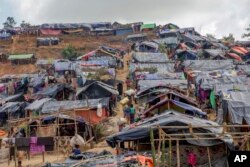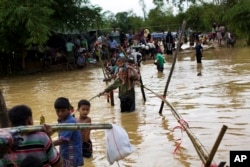The United Nations estimates some 429,000 Rohingya refugees have fled violence in Myanmar for Bangladesh since August 25. As the number edges toward half-a-million, U.N. agencies are increasing life-saving assistance to desperate people living in squalid settlements.
The number of daily arrivals has fallen to about 1,000 from a high of 20,000 a day. Nevertheless, that steep decline in refugee numbers has done little to ease overcrowding in the makeshift Rohingya sites near two official camps in southeastern Bangladesh.
Authorities have allocated an 800-hectare area to new arrivals. The U.N. refugee agency says it is speeding up the distribution of plastic sheeting so as many people as possible can have some protection from monsoon rain and wind.
UNHCR spokesman Andre Mahecic says health is a major concern given the inclement weather, overpopulated camps and lack of essential relief.
“There are risks of diseases," he said. "So, that is why the extension is so crucial to be able to release some of the pressure in the camps and to make sure that the new site is also organized in such a way that the sanitation and clean water can be there.”
World Health Organization spokeswoman Fadela Chaib says the Rohingya are at risk of waterborne diseases, such as malaria, dengue fever, cholera and diarrhea.
“We have also concerns about the injured," she said. "They need to be cared for. The immunization rate among children is very, very low and when you have a population of children who are malnourished, who are in the open, the risk of measles and other childhood disease is very high.”
Chaib says a team of epidemiologists is being deployed to assess the health risks. She says two million water purification tablets and 20,000 cholera kits are being distributed. She says a vaccination campaign against measles and polio launched nearly one week ago is being extended so all 150,000 targeted children are reached.







